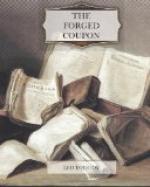Those halcyon days ushered in the dawn of an intimate friendship between himself and a lady who in the correspondence which ensued usually styled herself his aunt, but was in fact a second cousin. This lady, the Countess Alexandra A. Tolstoy, a Maid of Honour of the Bedchamber, moved exclusively in Court circles. She was intelligent and sympathetic, but strictly orthodox and mondaine, so that, while Tolstoy’s view of life gradually shifted from that of an aristocrat to that of a social reformer, her own remained unaltered; with the result that at the end of some forty years of frank and affectionate interchange of ideas, they awoke to the painful consciousness that the last link of mutual understanding had snapped and that their friendship was at an end.
But the letters remain as a valuable and interesting record of one of Tolstoy’s rare friendships with women, revealing in his unguarded confidences fine shades of his many-sided nature, and throwing light on the impression he made both on his intimates and on those to whom he was only known as a writer, while his moral philosophy was yet in embryo. They are now about to appear in book form under the auspices of M. Stakhovich, to whose kindness in giving me free access to the originals I am indebted for the extracts which follow. From one of the countess’s first letters we learn that the feelings of affection, hope, and happiness which possessed Tolstoy in Switzerland irresistibly communicated themselves to those about him.
“You are good in a very uncommon way,” she writes, “and that is why it is difficult to feel unhappy in your company. I have never seen you without wishing to be a better creature. Your presence is a consoling idea . . . know all the elements in you that revive one’s heart, possibly without your being even aware of it.”
A few years later she gives him an amusing account of the impression his writings had already made on an eminent statesman.
“I owe you a small episode. Not long ago, when lunching with the Emperor, I sat next our little Bismarck, and in a spirit of mischief I began sounding him about you. But I had hardly uttered your name when he went off at a gallop with the greatest enthusiasm, firing off the list of your perfections left and right, and so long as he declaimed your praises with gesticulations, cut and thrust, powder and shot, it was all very well and quite in character; but seeing that I listened with interest and attention my man took the bit in his teeth, and flung himself into a psychic apotheosis. On reaching full pitch he began to get muddled, and floundered so helplessly in his own phrases! all the while chewing an excellent cutlet to the bone, that at last I realised nothing but the tips of his ears—those two great ears of his. What a pity I can’t repeat it verbatim! but how? There was nothing left but a jumble of confused sounds and broken words.”
Tolstoy on his side is equally expansive, and in the early stages of the correspondence falls occasionally into the vein of self-analysis which in later days became habitual.




